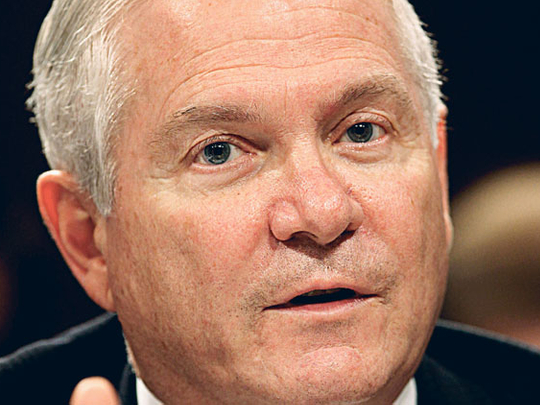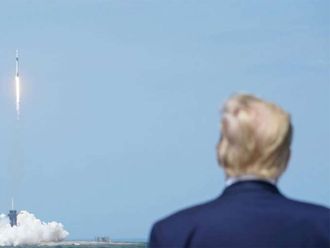
Dubai: As a Eagle Scout he would have learnt how to survive in the backwoods around Wichita, Kansas. Most importantly, he would have followed the motto drilled into every Boy Scout: Be Prepared.
But nothing Robert Gates learnt as a Boy Scout could have prepared him for a life in the world of intelligence gathering, counter-terrorism and protecting the interests of the United States in every corner of the globe. That's a world that Defence Secretary Gates, 67, is leaving when he retires on Thursday. And it's a world that he has shaped by a career in the corridors of power in the White House, the Pentagon and at CIA headquarters in Langley, Virginia.
Last month, As President Barack Obama watched a video feed of the top secret operation unfolding in Abbottabad, where Navy Seals were taking down Osama Bin Laden, Gates was by his side, snacking on shrimp, chips and turkey rolls.
Through successive Bush and Obama administrations, Gates has been the quarterback of the War on Terror, plotting its overt moves in Afghanistan, Pakistan and Iraq, and calling its covert moves where the need to know is a matter of life and death itself.
He has shared the pain of informing families of the deaths of their loved ones in action. He has signed at least 3,400 condolence letters since taking over as Pentagon chief in 2006.
For all his tough-guy credentials, death exacts a toll on the human spirit, more so when you are responsible for signing the deployment letters that send good men to their death.
Stark terms
There's no small wonder then why the astute, intelligent and analytical Gates chose to give a damning assessment of Nato as his parting shot, firing broadsides across the bows of America's allies.
Warning that the alliance faces a "dim, if not dismal, future," Gates said that Nato has two levels: "Those willing and able to pay the price and bear the burdens of alliance commitments, and those who enjoy the benefits of Nato membership, be they security guarantees or headquarters billets, but don't want to share the risks and the costs."
And in typically stark terms, Gates said the two-tier Nato "is unacceptable."
"The blunt reality," he noted, "is that there will be dwindling appetite and patience in the US Congress — and in the American body politic writ large — to expend increasingly precious funds on behalf of nations that are apparently unwilling to devote the necessary resources or make the necessary changes to be serious and capable partners in their own defence — nations apparently willing and eager for American taxpayers to assume the growing security burden left by reductions in European defence budgets."
But what of his legacy?
"In 2006, Gates inherited two main strategic problems: The ongoing counter-insurgency and counter-terrorism campaigns in both Iraq and Afghanistan," Dr Max Abrahms, a Fellow at Johns Hopkins University in Baltimore, Maryland, told Gulf News. "He responded in Iraq and Afghanistan with surges before deciding to reduce the overall number of troops in each country."
Problematic
Abrahms believes a smarter policy would have been to reduce the number of US troops there from the start.
"This is because increasing the number of foreign occupiers is highly problematic for winning either counter-insurgency or counter-terrorism campaigns," he said.
"To Gates' credit, he will be remembered for ultimately curtailing the number of American troops in Iraq and Afghanistan. But the reduction of these troops could have and should have been authorised sooner."
That's a view that's at odds with Alex Vatanka, a fellow at the Middle East Institute in Washington.
Failing
"Gates returned to office in late 2006 when America's military campaigns both in Iraq and Afghanistan were visibly failing," Vatanka said.
"New strategies were desperately needed and Gates was a steady known hand with impeccable leadership credentials. His was the anti-thesis of Donald Rumsfeld's partisanship and brash style." But Vatanka believes his appointment was more than just replacing Rumsfeld with a trusted hand.
"He was asked to be himself, a wholesome leader that could oversee a more balanced policy-making process at wartime," Vatanka said. "And then there is the man's persona. When you think about it, his ability to draw support from both the Democrats and Republicans for as long as he has and during wartime is quite a feat."
"Gates has not brought outright military victories in either Iraq or Afghanistan but one has to wonder about where we would be today without his policy realism at the helm in the last five years."





_resources1_16a30b3eac4_small.jpg)






